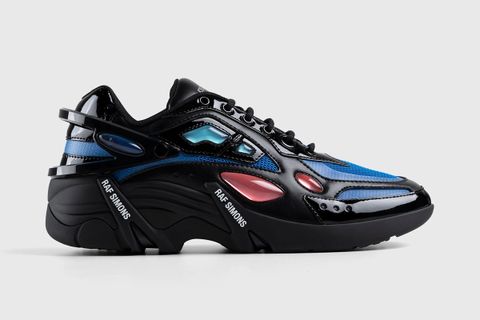Black Fashion Fair Digs Into FUBU’s 30-Year Archive
Hip hop’s favorite fashion brand is here to remind us of its legacy. In honor of its 30th anniversary, FUBU has tapped Antoine Gregory, founder of Black Fashion Fair, to design a collection inspired by its archives.
Building off of their previous collaboration for Museum World Tour, FUBU and Black Fashion Fair reunite to commemorate the streetwear brand’s birthday.
“[FUBU] is heavily ingrained in the fabric of Black culture,” Gregory said. “I wanted to honor not only the founders, but a generation of Black designers whose impact went largely undocumented. I chose to emphasize the logo,‘for us, by us,’ because that message is still important.”
The streetwear brand and multi-hyphenate sifted through FUBU’s archives to create a collection that reinterprets the label’s legacy for a contemporary audience. Available at Black Fashion Fair’s website, pieces including red and black sweat suits feature an updated take on FUBU’s logo, rendered in crystal script — a style that will resonate with Y2K enthusiasts.
Is there anything more quintessentially streetwear than FUBU? Launched in 1992, the brand was founded by Daymond John, Keith Perrin, J. Alexander Martin, and Carl Brown with the goal of creating a stylish line of clothing “made by the people who wore it.”
The quartet from Queens was set on connecting Black consumers with Black-produced clothing, and their vision went on to revolutionize street fashion, hip hop, and pop culture as a whole. FUBU’s influence throughout the height of the ‘90s positioned the brand as the go-to label for Black hip hop and R&B artists, rendering it one of fashion’s first streetwear giants.
A quick look at where FUBU has shown up in pop culture will show you that this brand is not one to play about. To name just a few examples of FUBU’s influence: Solange’s song, “FUBU,” the brand’s partnership with LL Cool J, and its collaboration with Pyer Moss, displayed in the Met’s “In America: A Lexicon of Fashion” exhibit.
Two years after the protests of summer 2020 pushed brands to issue performative pledges of solidarity, their promises have faded. Still, Black Fashion Fair stands by its founding commitment. From the start, its goal has been to platform Black designers and create a space where everyone can witness their contributions to art and culture.
Gregory explains why a collaboration with FUBU came naturally. “My goal is to elevate the location of Blackness in fashion,” he said. “The story of FUBU has so deeply enriched our culture. Telling this story is a necessary part of the legacy Black Fashion Fair is creating.”
30 years after its inception, FUBU has cemented itself as a culture-shaping force. It needs to be said: there would be no modern day streetwear without the contributions of FUBU, and Black Fashion Fair is here to remind us of that. As Solange so plainly puts it: "some shit is a must."


